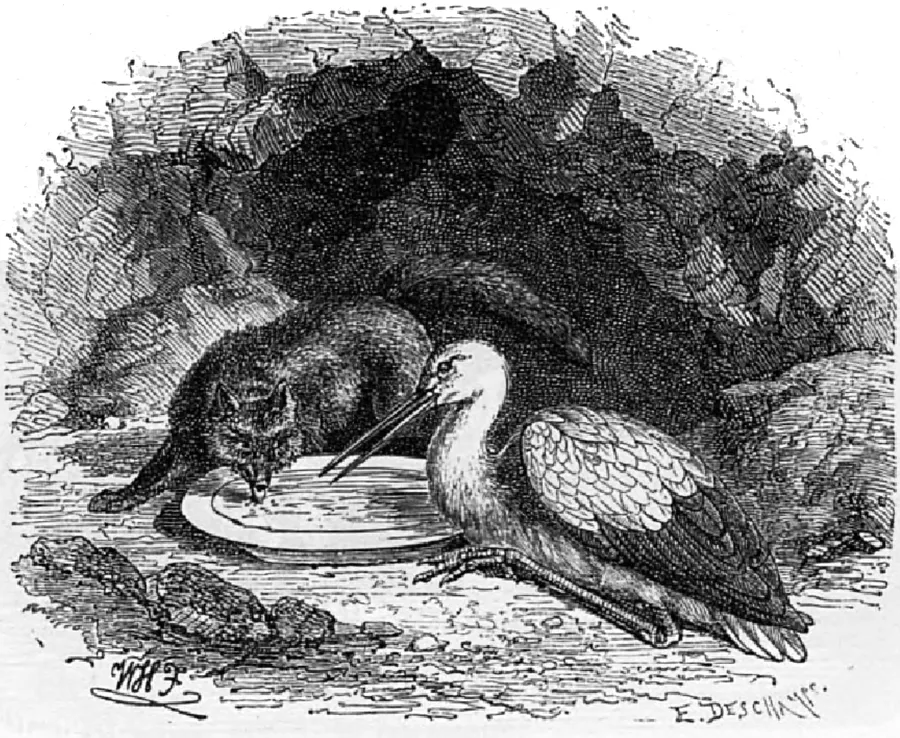The Fox and the Stork
The theme of this fable is basically: bullshitting the bullshitters. Over the years, we have seen many bullshitters on Steem/Hive. It seems to me that there are not as many these days.

Le Renard et la Cigogne
Compère le renard se mit un jour en frais,
Et retint à dîner commère la cigogne.
Le régal fut petit et sans beaucoup d’apprêts :
Le galant, pour toute besogne,
Avait un brouet clair ; il vivait chichement.
Ce brouet fut par lui servi sur une assiette :
La cigogne au long bec n’en put attraper miette ;
Et le drôle eut lapé le tout en un moment.
Pour se venger de cette tromperie,
À quelque temps de là la cigogne le prie.
Volontiers, lui dit-il ; car avec mes amis
Je ne fais point cérémonie.
À l’heure dite, il courut au logis
De la cigogne son hôtesse ;
Loua très-fort sa politesse ;
Trouva le dîner cuit à point :
Bon appétit surtout ;
renards n’en manquent point.
Il se réjouissait à l’odeur de la viande
Mise en menus morceaux,
et qu’il croyait friande.
On servit, pour l’embarrasser,
En un vase à long col et d’étroite embouchure.
Le bec de la cigogne y pouvait bien passer ;
Mais le museau du sire était d’autre mesure.
Il lui fallut à jeun retourner au logis,
Honteux comme un renard
qu’une poule aurait pris,
Serrant la queue, et portant bas l’oreille.
Trompeurs, c’est pour vous que j’écris :
Attendez-vous à la pareille.
The Fox and the Stork
One day, the fox made an effort,
And kept his neighbor the stork to dinner.
The treat was small and not much prepared:
The gallant, for the whole meal,
Had a clear broth; he lived frugally.
This broth was served by him on a plate:
The long-beaked stork could not catch a crumb;
And the fellow had lapped it all up in a moment.
To avenge this deception,
Some time later the stork invites him back.
Willingly, he told her; because with my friends
I don't do ceremonies.
At the appointed time, he ran to the house
Of the stork his hostess;
Loudly praised her politeness;
Found dinner cooked to perfection:
Above all, bon appetit;
foxes do not lack it.
He rejoiced at the smell of meat
Cut into small pieces,
which he thought to be delicious.
She served it, to embarrass him,
Into a vase with long neck and narrow mouth.
The stork's beak could well pass through it;
But the sire's muzzle was of another measure.
He had to return home on an empty stomach,
Ashamed as a fox
taken by a hen,
Clutching his tail, and carrying his ear low.
Deceivers, it is for you that I write:
Expect the same.
First Fable: The Circada and the Ant
Previous fable: The Wolf and the Lamb
Next Fable: The Oyster and the Litigants
The Life of Aesop, by Jean de La Fontaine - part 3
Among other stuff, this merchant, who at that time owned Aesop, trafficked in slaves: so much so that going to Ephesus to get rid of those he had, what each of them had to carry for the convenience of the journey was divided according to their employment and according to their strength. Aesop asked that due consideration would be given to his size; that he was a newcomer, and should be treated gently. You won't carry anything, if you want, his comrades told him. Aesop prided himself on honor and wanted to have his load like the others. So they let him choose. He took the basket of bread: it was the heaviest burden. Everyone thought he had done it out of stupidity: but after lunch, the basket was lighter, and the Phrygian relieved accordingly; so in the evening, and likewise the next day: so that at the end of two days he walked empty. The character's common sense and reasoning were admired.
As for the merchant, he got rid of all his slaves, except for a grammarian, a cantor, and Aesop, whom he went to exhibit for sale in Samos. Before leading them into the square, he had the first two dressed as neatly as he could: Aesop, on the contrary, was dressed only in a sack and placed between his two companions, to give them luster. A few buyers showed up, including a philosopher called Xantus. He asked the grammarian and the cantor what they knew how to do. Everything, they went on. This made the Phrygian laugh: one can imagine how. Planudes reports that they nearly fled, he grimaced so horribly. The merchant made his cantor a thousand obols, his grammarian three thousand; and, in case one of the two were bought, he had to give Aesop over the bargain. The cost of the grammarian and the cantor disgusted Xantus. But, in order not to return home without having done some shopping, his disciples advised him to buy this little piece of a man who had laughed so graciously: we could make a scarecrow of him; he would entertain people with his looks. Xantus allowed himself to be persuaded and bought Aesop for sixty obols. He asked him, before buying him, what it would be suitable for, as he had asked his comrades. Aesop answered: Nothing since the other two had kept everything to themselves. The customs clerks generously gave Xantus the penny for a pound and gave him a receipt without paying anything.